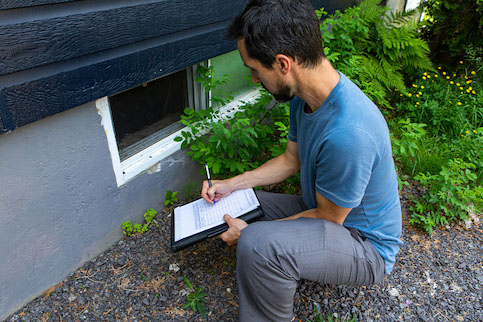A home is more than just four walls: it’s a place of comfort and security. Yet, beneath the surface, even the most charming abode may hold secrets. The pivotal role of a home inspection comes into play when you’re trying to buy your dream home. Like a skilled detective, a licensed home inspector peers into every nook and cranny, revealing the true condition of a property. From checking the roof for leaks to testing the foundation, the home inspection empowers you to make an informed decision when purchasing a house. Read on to learn more and to download a free home inspection checklist.
What Is A Home Inspection And How Does It Work?
A home inspection is a thorough examination of the condition of a residential property. It helps uncover any issues with a property that may affect its value or your desire to live there. A licensed home inspector will conduct the examination by walking through the property and noting its condition. They’ll assess the overall condition of the property, identify any potential problems or defects, and provide a detailed report to the prospective buyer.
Here’s how a home inspection typically works:
- Scheduling: After the seller accepts an offer from a buyer to purchase the home, the buyer usually has a specified period to conduct a home inspection.
- Hiring a home inspector: The buyer will hire a licensed or certified home inspector. It’s crucial to choose a qualified professional with a good reputation and membership with a recognized industry association.
- Conducting the Inspection: The home inspector will visit the property and perform a thorough examination, which will likely take a couple of hours. The inspector will assess various aspects of the home, including but not limited to:
- Structural components (foundation, walls, roof)
- Exterior (siding, windows, doors)
- Interior (walls, ceilings, floors)
- Plumbing system
- Electrical system
- Heating, ventilation and air conditioning (HVAC) systems
- Appliances
- Attic and insulation
- Basement or crawl space
- Generating a report: After the inspection, the home inspector will provide the buyer with a detailed report. This report outlines the findings, including any defects, safety concerns or recommended repairs. It may also include photographs for reference.
A home inspection informs the buyer about the property and also provides the grounds for acting on an inspection contingency. An inspection contingency is a clause in a real estate contract specifying the conditions under which a buyer can negotiate with the seller or opt out of the contract based on the results of a home inspection. For example, if the inspection reveals a leaky roof, the buyer can ask the seller to repair it or lower the asking price to address the issue. If the seller won’t budge on the roof, the inspection contingency also allows the buyer to walk away from the deal without losing their earnest money.
As a result, the home inspection is a crucial step in the home buying process that allows the buyer to understand the condition of the property they’re purchasing. The inspection contingency provides a safety net for the buyer, allowing them to negotiate or withdraw from the contract if concerns emerge during the inspection.
See What You Qualify For
Buy A Home
Discover mortgage options that fit your unique financial needs.

Refinance
Refinance your mortgage to have more money for what matters.
Tap Into Equity
Use your home’s equity and unlock cash to achieve your goals.
How To Find A Home Inspector
To schedule an inspection, you must hire a certified home inspector. The process of hiring one is like finding a real estate agent. First, it’s advisable to gather recommendations from your family and friends. Anyone in your network who recently bought a home or has a connection with an inspector can provide a trustworthy reference.
Once you have a list of candidates, check their reviews on sites such as Angi (formerly Angie’s List), the Better Business Bureau, Yelp and Google. If the consensus on an inspector is negative, you can strike them off your list. Then, when you narrow down your choices, contact them through phone or email. It’s vital to ask questions about the following:
- Cost
- Area of expertise
- Their certification/licensure
- If they’re bonded and insured
- The length of the inspection and report expectations
- Membership of a professional home inspector association
House Inspection Checklist For Buyers
While home inspections may vary depending on the home’s features (such as a septic system requiring its own inspection), each inspection covers a core set of factors. Home buyers can expect their inspector to run through the following list:
Exterior
The home’s exterior protects you from the elements, creates curb appeal and affects your utility bills. Here’s what an inspector will look for on the outside:
- Siding: Peeling paint, hail damage and cracks can create problems with insulation, pests, and water damage.
- Doors: Doors should open smoothly and fit well to their frames. An ill-fitting door lets in more air from the outdoors, reducing energy efficiency.
- Windows and skylights: Windows should be well-insulated and snug. Poorly installed windows are a main culprit for energy inefficiency.
- Roof: An old roof in need of repair can let in water and cold air, causing a host of problems. The inspector should mention any holes, loose shingles and aging material on your report.
- Foundation: Home foundation issues include cracking, sinking or crumbling, leading to severe structural dangers.
- Walkways and driveways: Driveways can crack, lose their levelling and cause drainage issues due to damage or poor installation.
- Yard landscaping and drainage: The yard should be level and contain no standing water. Drainage problems from ground conditions can cause flooding and pests and make the yard unusable.
- Gutters and downspouts: Likewise, gutters and downspouts that don’t divert water correctly can cause flooding, foundation erosion, and mold.
- Porches, patios and decks: These surfaces can suffer cracks, splintering, weak supports, sinking, and mold.
- Fencing: Your inspector should note the condition of the fencing, including any gaps, breakages, and signs of age.
- Detached garage or shed: Detached structures generally have foundations and wooden walls. As a result, they can suffer foundation damage, pest damage, and roof problems.
Interior
The inspector will also conduct a thorough evaluation of the home interior, checking features in every room. Here’s what to expect on your inspection report:
- Attic: The inspector will climb into the attic (if there is one) and look for insufficient insulation, structural damage, ventilation, and water stains.
- Basement and crawl space: Basements and crawl spaces are often home to pests. In addition, they are subject to flooding and mold. If the basement has a sump pump, it should be in working order.
- Plumbing: Every piece of plumbing should function properly and not leak. Toilets should flush, faucets should run hot and cold water, the garbage disposal should work, and sinks and tubs should drain quickly.
- Appliances: The washer, dryer, smoke detectors, carbon monoxide detectors, ceiling fans, and other appliances should work without issue.
- Electrical system: Lights should turn on without flickering, and each outlet should be active. In addition, the service panel should be operational, and all wiring should be inside the walls.
- Walls and ceilings: Walls and ceiling should be level. The inspector should also note any damage, including scratches and stains.
- Stairs and handrails: Safety is paramount in a home, so the stairs and handrails should be solid and stable.
- Garage: Garage door openers should be functional, and your inspector should evaluate the interior for damage.
- HVAC: The HVAC system should work efficiently without producing a gas odor. In addition, the air conditioning unit should be rust-free.
- Kitchen cabinets and drawers: Cabinets and drawers should open fully. Your inspector should note signs of damage and evidence of pests.
- Chimneys: The flue should open without issue and have no cracks or gaps. If the chimney connects to a fireplace, the smoke should ventilate upward.
Home Buyer Inspection Checklist: FAQs
Here are the answers to some frequently asked questions about home inspections to help you in your home buying journey:
Why should I get a home inspection?
A home inspection will reveal problems with the home that untrained eyes or overexcited homebuyers can miss. The inspection allows you to understand what you’re buying and negotiate with the seller based on an independent party’s assessment of the home’s condition.
What isn’t included in a home inspection?
Although a home inspection is comprehensive, it leaves out certain details. For example, you won’t get a report on the radon gas level, swimming pool condition, presence of asbestos, the sewer line, mold or lead paint.
What’s covered in the inspection will depend on the type of loan you’re getting. For example, many government-backed loans will require the home meet certain guidelines. Purchasing a home with a Federal Housing Administration (FHA) loan means the inspector will check for lead paint, window size for a fire escape in each room, emergency access, pest infestations, and property encroachment. On the other hand, a Department of Veterans Affairs (VA) loan requires the inspection to cover dry rot, safety of the drinking water, sewage disposal, radon, and asbestos.
How can I prepare for a home inspection?
Before inspection day, ask your inspector how long the procedure will take, and clear enough time on your calendar to be available for the inspection. On inspection day, bring your checklist, notebook, and a pen to write down potential repairs, issues, and other information you want to remember as you walk through the home. In addition, be sure to ask your inspector any questions you have along the way.
Can I make my own house inspection checklist?
You can download your own home inspection checklist for an easy way to track each factor of the home inspection. This list is a comprehensive rundown of each facet of the home and allows you to check each box as you walk through with your inspector.
The Bottom Line
Preparing for a home inspection with a checklist is vital to the home buying process because you will get an accurate idea of the home’s condition before buying it. This knowledge allows you to negotiate with the seller based on facts and could give you the freedom to back out of the contract with your earnest money intact. If you’re just starting your home buying journey, download the inspection checklist to get ahead of the game.
Home Inspection Checklist
Learn what your home inspection covers and what it doesn’t.

Ashley Kilroy
Ashley Kilroy is an experienced financial writer who writes for solo entrepreneurs as well as for Fortune 500 companies. She is a finance graduate of the University of Cincinnati. When Ashley isn’t helping people understand their finances, you may find her cage-diving with great whites or on safari in South Africa.












